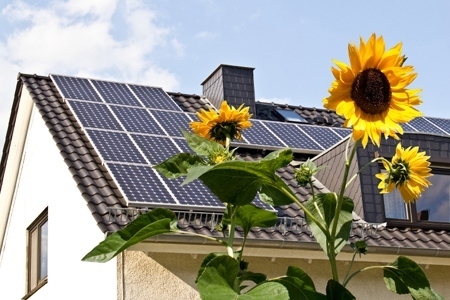Share

Financing Solar Power For Your Home
Financing solar panels for your home isnt cheap. The good news is that there are many options.
Based on the average house paying $75 per month for electricity, a solar system that generates that much power costs around $25,000 to $35,000, according to the Solar Power Authority.
Utility company incentives, tax breaks and other subsidies can cut the cost in half, but even then it can take years for the solar panels to pay for themselves in energy savings.
A system that costs $18,000 ” which includes installation, labor and the solar power system ” has a payback period of about 20 years, the Solar Power Authority estimates.
Here are some ways to finance solar power for your home:
Tax breaks
Tax credits, rebates and other ways to save on renewable energy can be searched by state at the U.S. Department of Energy website. County and state governments have programs to make solar power affordable, as do local utility companies.
In 2016 the federal solar tax credit, also known as the investment tax credit (ITC) was extended for five years. It allows 30 percent of the cost of installing a solar energy system to be deducted from federal taxes. There is no cap on its value.
Solar lease or power purchase agreement
For people who dont want to take out a loan or otherwise pay upfront for a solar system, leasing can be an easy way to get solar power.
A solar provider installs the system and is responsible for maintenance, monitoring and repairs. The company also gets the tax credit. Many leases have the option to buy the solar panels after the contract is up, which can be as long as 20 years.
The customer pays the company each month for the amount of solar power their system generated, usually at a lower rate than what their electric company is charging them.
Another type of solar lease, called a power purchase agreement, or PPA, requires customers to pay a set amount for every killowatt hour the solar system produces.
Home equity loan
A home equity loan or home equity line of credit uses a house as collateral. Interest rates are generally low and the loans can make sense if the homeowner will save more on their electricity bills compared to their loan payments. Mortgage interest can usually be deducted from federal taxes.
There are many home loan programs for solar power systems. Some are listed in a federal overview of how to finance solar energy systems by the U.S. Department of Energy.
Property Assessed Clean Energy Program (PACE)
Some states offer a PACE program, which allows municipalities such as a city, county or state to loan money for solar energy that is repaid by the homeowner through an additional assessment on their property taxes for 15 to 20 years.
The programs dont reduce equity in a home. If the home is sold, the tax liability is transferred to the new owner.
Feel free to contact me for more real estate information.
Published with permission from RISMedia.
STAY IN THE LOOP





